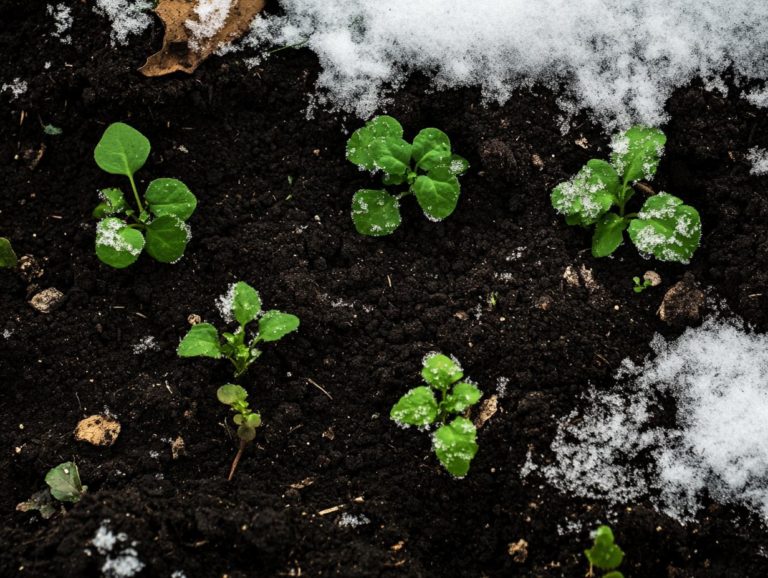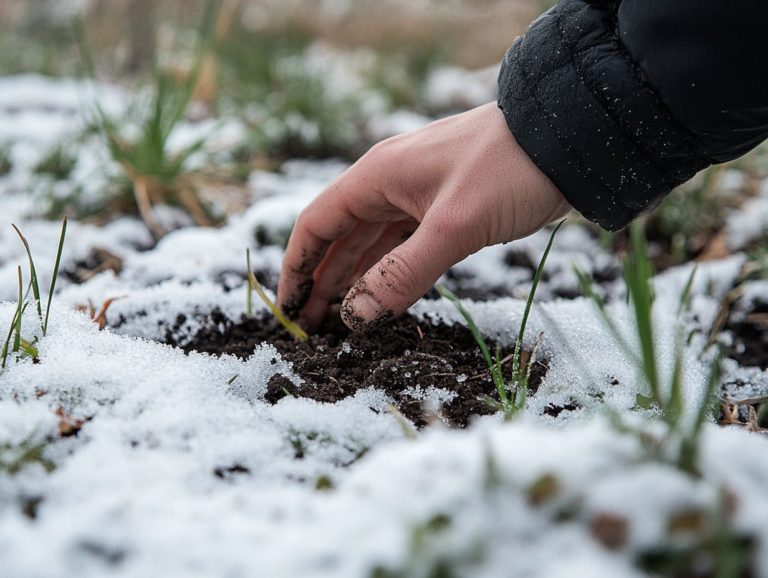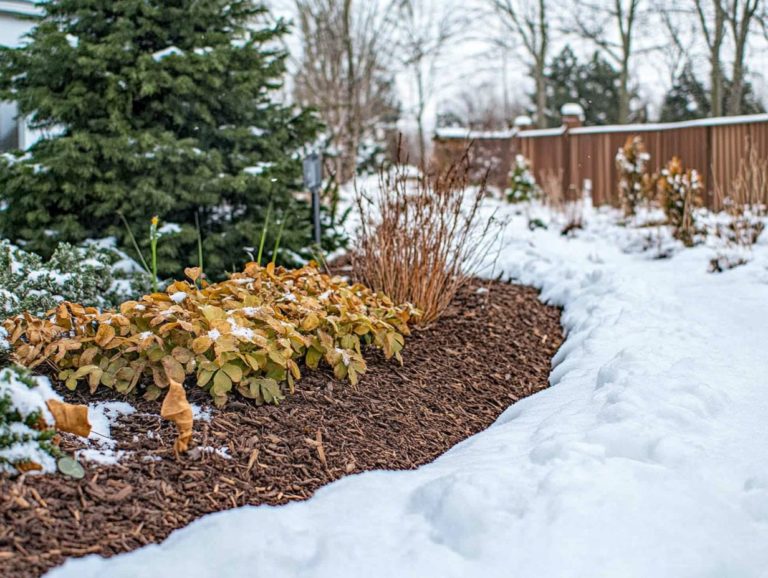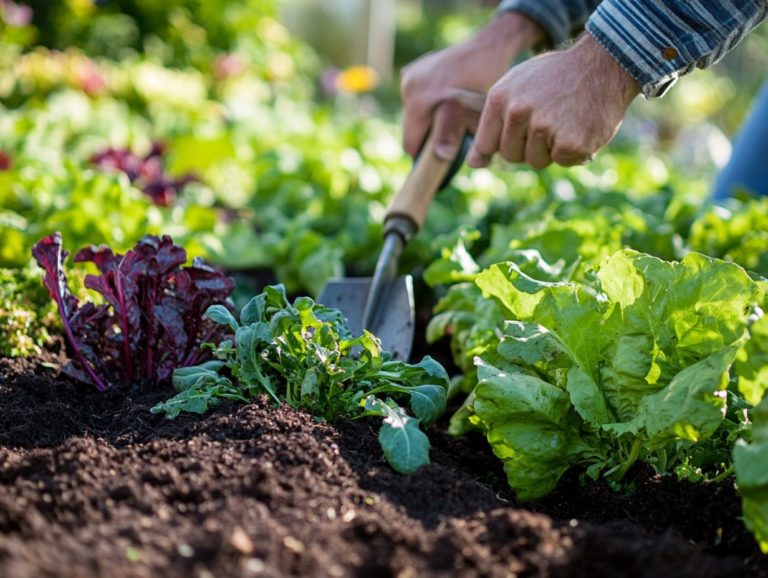Soil Management Techniques for Successful Gardening
Soil serves as the bedrock of any flourishing garden, yet many gardeners tend to overlook its intricacies, often neglecting the importance of soil health.
Grasping the nuances of soil composition and its essential components is vital for nurturing healthy plants and maximizing your yields. This guide will delve into fundamental soil management techniques, such as testing and evaluating soil quality, enhancing its health and fertility, and selecting the ideal plants for your specific soil conditions.
Get ready to transform your garden into a vibrant oasis! You will uncover strategies for maintaining soil vitality and tackling common challenges. Regardless of whether you re a seasoned gardener or just embarking on your journey, this guide will empower you to cultivate a thriving garden from the ground up.
Contents
- Key Takeaways:
- Why Soil Composition Matters
- Testing and Evaluating Your Soil
- Improving Soil Health
- Choosing the Right Plants for Your Soil
- Maintaining Soil Health
- Addressing Common Soil Issues
- Frequently Asked Questions
- What are soil management techniques for successful gardening and why are they important?
- How often should I test my soil for nutrient levels and pH?
- What are some common methods for improving soil health?
- Can I use chemical fertilizers for soil management in gardening?
- What is the importance of mulching for soil management in gardening?
- How can I prevent soil erosion in my garden?
Key Takeaways:
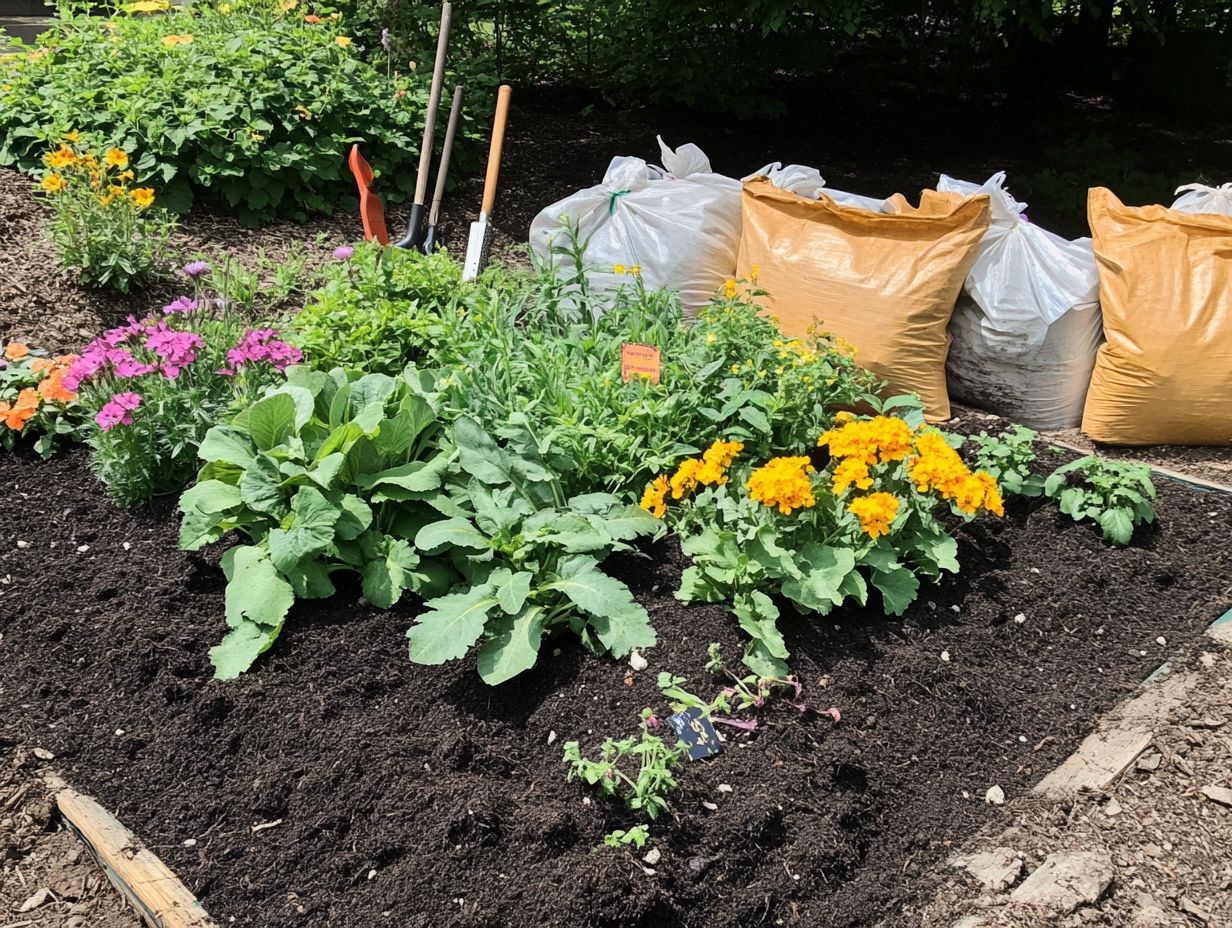
- Know your soil composition: Understanding the key components and their importance will help you determine the best management techniques for your gardening success.
- Test and evaluate your soil regularly: Use methods such as soil testing and analysis to assess soil quality and make necessary improvements for healthy plant growth.
- Match plants to soil conditions: Choosing the right plants for your soil will ensure they thrive and reduce the need for constant maintenance and soil amendments.
Why Soil Composition Matters
Understanding soil composition is essential for anyone with a passion for gardening, as it plays a crucial role in soil health and plant growth. Soil is far more than just dirt; it s a complex mix of organic matter, minerals, gases, liquids, and an array of organisms.
When you analyze the composition of soil, you uncover its texture, shaped by the size and distribution of particles sand, silt, and clay. Each soil type possesses distinct properties that influence everything from water retention and aeration to the availability of nutrients for your plants.
Understanding these elements helps you manage soil effectively, improving soil quality and ensuring optimal soil conditions.
Key Components and Their Importance
The key components of soil include organic matter, nutrients, soil pH, and microbial activity, all playing a vital role in maintaining soil health and fertility. Each of these elements contributes uniquely to the soil’s physical and chemical properties.
Take organic matter, for instance. It not only enhances soil structure by promoting aggregation, which creates air pockets for healthy root growth, but it also significantly improves the soil’s water retention capabilities, reducing both erosion and runoff.
You ll find that maintaining a balanced soil pH is essential, as it directly impacts the availability of crucial nutrients. An imbalance can lead to nutrient lockout, which is when plants can’t access necessary minerals, depriving your plants of the minerals they need to thrive.
Microorganisms act as nature’s recyclers, breaking down organic materials and releasing nutrients in forms that plants can readily absorb, thereby enhancing both soil quality and agricultural sustainability. Each component interacts with others, creating a complex web that sustains life and productivity in any ecosystem.
Testing and Evaluating Your Soil
Testing and evaluating your soil is an essential cornerstone of successful gardening and agricultural endeavors. It gives you the power to make informed decisions regarding soil management and enhancement.
A comprehensive soil test offers invaluable insights into nutrient levels, pH, and overall soil health. By analyzing soil samples, you can identify specific issues like compaction or insufficient organic matter. Grasping these elements is crucial for customizing treatments and amendments that boost soil fertility and support robust plant growth.
Whether you’re cultivating crops or tending to a home garden, regular soil testing guarantees the optimal conditions your plants need to thrive. Start testing your soil today for a healthier garden tomorrow!
In summary, understanding soil health is fundamental to cultivating a thriving garden. By focusing on soil composition, testing, and matching plants to soil conditions, you can enhance your gardening success and ensure your plants flourish.
Methods for Assessing Soil Quality
Assessing soil quality requires a multifaceted approach that evaluates soil pH, compaction, moisture levels, soil temperature, and overall health. All these factors are essential for effective gardening and farming practices.
You can start with visual inspections, where observing soil color and texture provides immediate insights into its condition. Soil testing kits take it a step further, offering a detailed analysis of nutrient levels that allows for precise amendments to boost fertility.
For a thorough assessment, laboratory analysis is often the gold standard. This method examines the soil’s physical and chemical properties, enabling you to make informed decisions tailored to your needs.
Ignoring soil quality will lead to stunted plant growth and lower yields. Regular checks are crucial for successful gardening, ensuring that your garden or farm thrives.
Improving Soil Health

Improving soil health is paramount for maximizing soil fertility and ensuring vigorous plant growth in both your gardening and agricultural pursuits.
Techniques such as applying organic amendments like compost and utilizing cover crops can profoundly enhance soil structure and nutrient content.
The organic matter from compost not only replenishes essential nutrients but also bolsters microbial activity, which is critical for nutrient cycling.
Using soil treatments can fix problems and adjust the soil’s pH, creating a more favorable environment for plant roots to flourish and ensuring optimal soil moisture.
Methods for Enhancing Soil Fertility
Enhancing soil fertility is all about replenishing essential nutrients like nitrogen, phosphorus, and potassium these are crucial for supporting the health and growth of your plants.
These methods not only maximize crop yields but also play a significant role in maintaining the balance of the ecosystem. By using fertilizers, whether synthetic or organic, you can quickly and effectively boost nutrient levels in your soil.
Organic amendments such as compost and manure enrich the soil structure and promote beneficial microbial activity, creating a thriving environment for your plants.
Techniques like crop rotation and cover cropping help with nutrient cycling, ensuring that your soil stays fertile over time. Achieving a well-balanced nutrient profile fosters robust growth, leading to a flourishing garden or farm and highlighting the essential connection between soil health and agricultural success.
Choosing the Right Plants for Your Soil
Choosing the right plants is the secret to a thriving garden! Different soil types and conditions profoundly affect plant growth and health. By understanding the specific needs of various plants, you can align your selections with the existing soil properties, ensuring that plant roots can establish themselves effectively.
Whether you re dealing with sandy soil or clay, it s crucial to grasp how each type influences water retention, aeration, and nutrient availability. This knowledge gives you the power to make informed decisions that enhance both the aesthetic appeal and functional aspects of your garden.
With the right approach, you can create a thriving landscape that reflects your vision and effort.
Matching Plant Needs to Soil Conditions
When you’re matching plant needs to soil conditions, it’s essential to consider factors like soil texture, moisture levels, and nutrient availability to foster optimal plant growth.
Different plants have their preferences when it comes to soil types. For instance, sandy soils offer excellent drainage but may demand more frequent watering, while clay soils tend to hold moisture yet can struggle with aeration.
Understanding these dynamics is key; succulents, for example, thrive in well-drained, sandy loam, whereas ferns feel right at home in rich, loamy soil that retains some moisture.
Plants such as tomatoes flourish with nutrient-rich organic matter, making it crucial to assess your soil s nutrient profile. By conducting a soil test and taking its texture into account, you can select the right plants that will thrive in your unique environment, leading to a healthier and more vibrant garden.
Maintaining Soil Health
Healthy soil is the foundation of a flourishing garden. Let s explore how to achieve this!
Maintaining soil health demands your commitment to consistent care and management practices that create the ideal conditions for plant growth and ecosystem balance.
Regular activities like mulching, watering, and aerating compacted soil create a thriving environment for beneficial soil organisms. These practices also enhance nutrient cycling.
Keeping your soil well-drained and preventing compaction are vital for supporting strong root development and maintaining proper moisture levels.
By incorporating these practices into your routine, you guarantee sustained soil quality and health, paving the way for long-term gardening success.
Practices for Sustaining Soil Quality
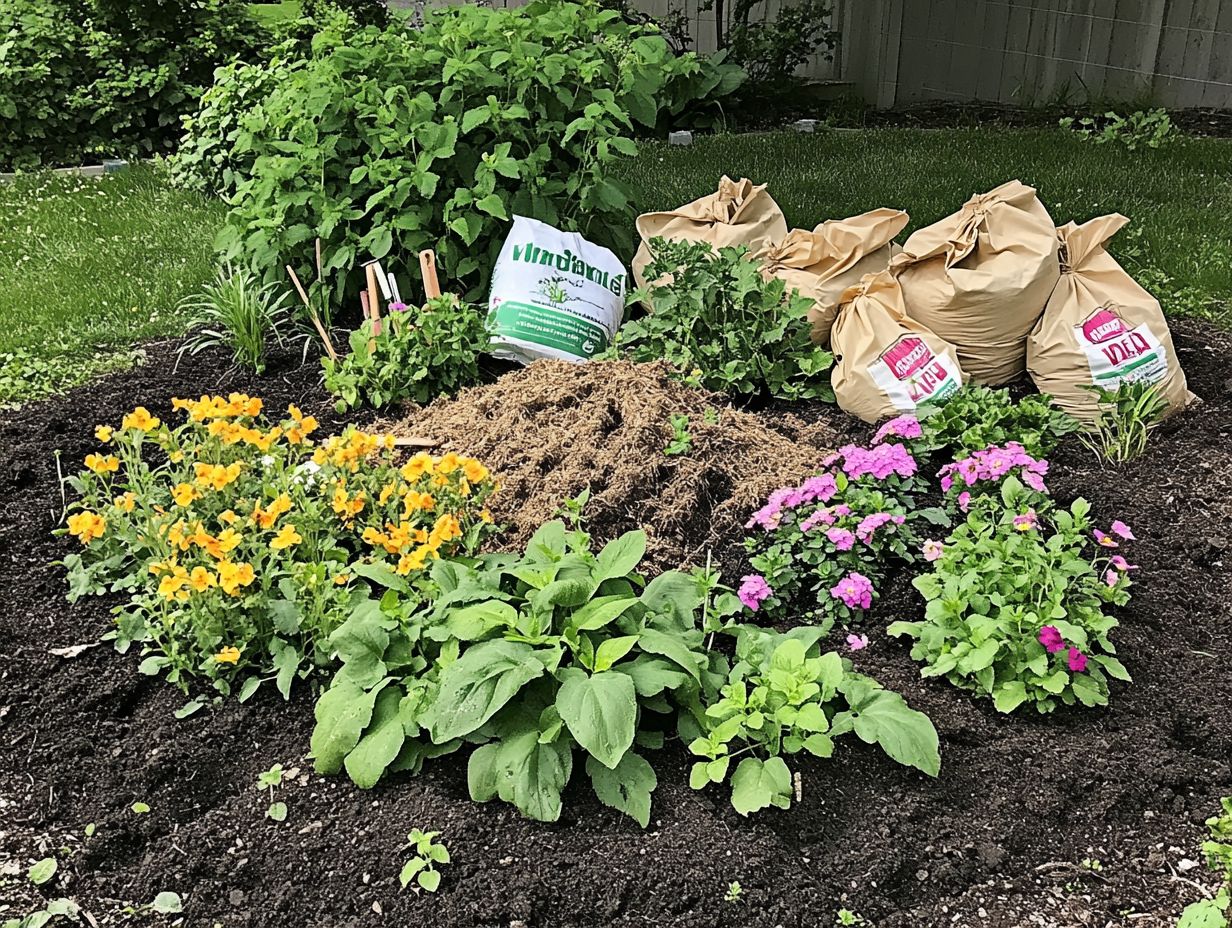
To sustain soil quality, embrace practices like using organic amendments, composting, and using effective soil management methods. These approaches cultivate a thriving ecosystem within the soil, promoting healthier plant growth and greater yields.
Regularly applying compost enriches your soil with essential nutrients such as nitrogen, phosphorus, and potassium. This ensures your plants receive a balanced diet.
Incorporating crop rotation effectively breaks pest cycles and prevents nutrient depletion since different crops draw on various soil nutrients. Additionally, cover cropping prevents erosion, suppresses weeds, enhances moisture retention, and creates a resilient soil environment that supports your sustainable gardening and farming practices.
Addressing Common Soil Issues
Addressing common soil issues is essential for cultivating flourishing gardens and landscapes. Problems such as soil compaction and imbalanced pH levels can significantly impede plant growth.
Soil compaction diminishes aeration and water retention, ultimately stunting root development and compromising overall soil health. An improper pH can restrict nutrient availability, making it vital for you to identify and resolve these issues swiftly.
By employing effective soil treatments and enhancement techniques, you can restore optimal conditions, allowing your plants to thrive beautifully.
Identifying and Solving Soil Problems
Identifying and resolving soil problems necessitates a comprehensive soil analysis to accurately pinpoint issues such as nutrient deficiencies, compaction, or waterlogging.
This vital process begins with you collecting soil samples from various sections of your garden or field, ensuring you achieve a representative mix. Once your samples are prepared and sent to a laboratory, the results will unveil essential information about pH levels, organic matter content, and the presence of key macronutrients like nitrogen, phosphorus, and potassium.
By regularly monitoring these factors, you can easily recognize common soil issues, such as a hard crust indicating compaction or unevenness suggesting poor drainage. To effectively manage these challenges, implement practices like cover cropping, crop rotation, or incorporating organic amendments. These strategies can significantly enhance soil vitality, ultimately supporting healthier plant growth and boosting your yields over time.
Frequently Asked Questions
What are soil management techniques for successful gardening and why are they important?
Soil management techniques help keep your garden soil healthy, ensuring plants grow optimally. They are important because healthy soil provides essential nutrients, water retention, and aeration for plants to thrive.
How often should I test my soil for nutrient levels and pH?
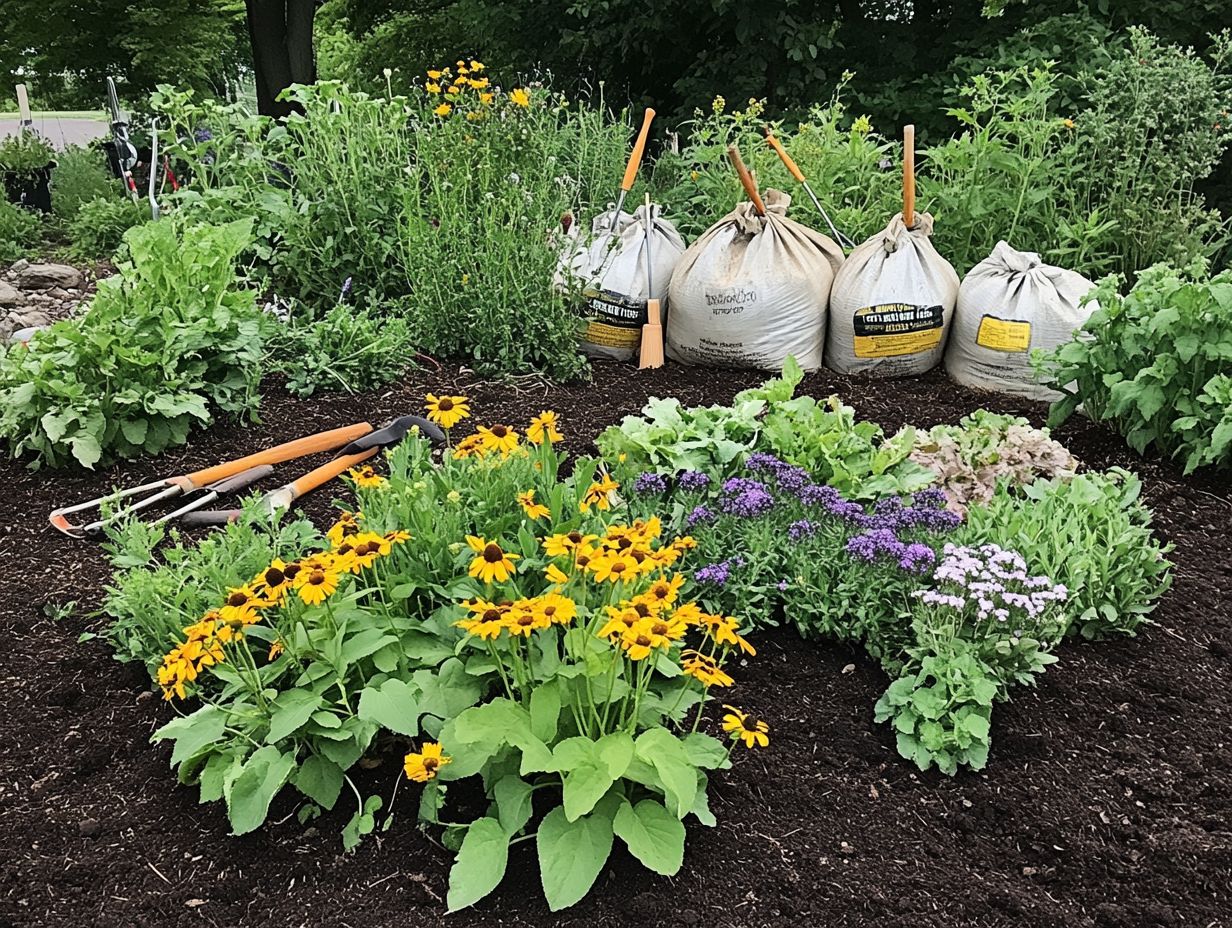
It is recommended to test your soil at least once a year for nutrient levels and pH. This will help you determine if any amendments are needed to maintain a balanced and productive soil for your garden.
What are some common methods for improving soil health?
Improving soil health is vital for a thriving garden. You can add natural materials like compost or manure, rotate your crops, use plants to protect the soil, and practice minimal tillage.
Can I use chemical fertilizers for soil management in gardening?
Chemical fertilizers provide a quick boost of nutrients. However, they can harm long-term soil health and beneficial microorganisms. Organic fertilizers are a better choice for sustainable gardening.
What is the importance of mulching for soil management in gardening?
Mulching is a must! It retains moisture, regulates temperature, and suppresses weeds. As mulch breaks down, it enriches the soil, improving its health over time.
How can I prevent soil erosion in my garden?
Preventing soil erosion is essential for maintaining healthy gardens. Techniques like contour farming, terracing, and planting windbreaks slow down water and wind, protecting your valuable topsoil.

